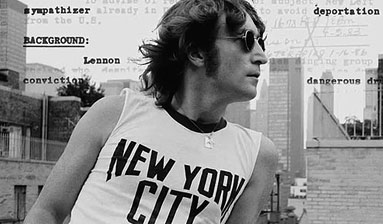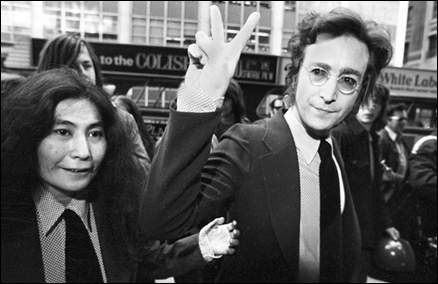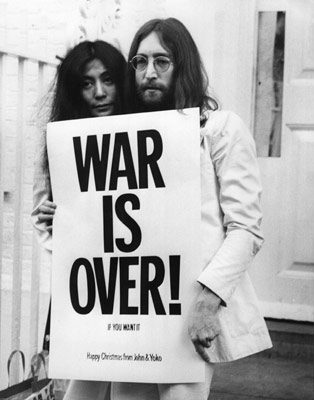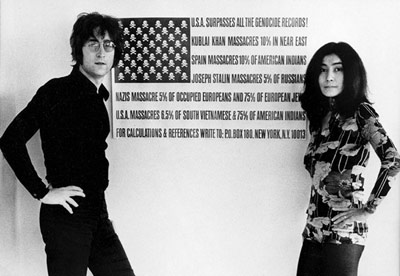The U.S. Vs John Lennon
WHAT THE CRITICS ARE SAYING
Review by David Stratton, At the Movies
Margaret:  David:
David: 
A documentary tracing John Lennon's metamorphosis from lovable Beatle, to anti-war activist, as the true story of how and why the U.S. government tried to silence him ...
It's a fascinating chapter in the popular culture of the late 20th Century that John Lennon, soon after the immensely popular group, The Beatles, imploded, quickly became, in the eyes of the Nixon Administration, an enemy of America.
This very comprehensive and informative documentary, by David Leaf and John Scheinfeld, concentrates on the post-Beatles period.
Now married to Yoko Ono, Lennon becomes more and more fixated on the Vietnam War and other aspects of American policy - such as the attitude towards African American activists - while at the same time choosing to live in New York.
Singing at a 1971 benefit for John Sinclair, a man imprisoned for ten years for selling two joints to an undercover policewoman, was one of the events that enraged the authorities; another was appearing on a TV show with Bobby Seale, leader of the Black Panthers.
 It didn't help that "Give Peace A Chance" became the anthem of the anti-war movement.
It didn't help that "Give Peace A Chance" became the anthem of the anti-war movement.
This film is an invaluable reminder of what the 70s was really like; the frustration of the war, the increasing unrest in America's cities, the general chaos.
Lennon himself comes across as deeply committed and passionate, an unconventional thinker who, possibly under Yoko's influence, used unconventional ways to bring to the attention of the world the things that mattered to him.
Given that this film was made with the co-operation of Yoko Ono it is probably not surprising that it's pretty sympathetic to her points of view as well.
Talking heads include an unrepentant G. Gordon Liddy of Watergate infamy, Angela Davis, George McGovern and Ron Kovic of BORN ON THE FOURTH OF JULY fame.
The songs, the newsreels, the interviews -- it all adds up to an invigorating look at an incredible era.
Further comments
DAVID: Margaret?
MARGARET: I mean, the filmmakers were incredibly lucky that they got the cooperation of Yoko on this.
DAVID: Yes.
MARGARET: Because she's made available...
DAVID: A lot of stuff.
MARGARET: ....an awful lot of stuff.
DAVID: Yeah.
MARGARET: Including the music.
DAVID: Yes.
MARGARET: Because a lot of it is played underneath without the lyrics.
DAVID: That's right.
MARGARET: So, it's sort of rare stuff indeed. I think it's, you know, it's a reminder of how her performance art married with his political ideals.
DAVID: Yes.
MARGARET: I think it's interesting for us because it's so much a part of our lives...
DAVID: Yeah.
MARGARET: ...our history, you know, this era.
DAVID: It's interesting, isn't it, that one of the reasons I think that the American administration was so disturbed by John Lennon was that they'd just bought the voting age down from 21 to 18 and so suddenly...
MARGARET: Yes.
DAVID: ...teenagers, late teenagers, were exactly John Lennon's audience.
MARGARET: Yeah, but it's interesting, you know. I mean, he was, when this was all happening he was only about 30, you know. There's an almost innocence about...
DAVID: Yeah.
MARGARET: ...him that's actually quite beautiful.
DAVID: But a steely determination, too.
MARGARET: Yes.
DAVID: Yeah.
MARGARET: But, you know, BONO's doing it now in a way.
DAVID: Yes. Yes.
MARGARET: Using that sort of fame for the causes that they believe in.
DAVID: Yes.
MARGARET: No, I think this is a really interesting document.
DAVID: It's a good documentary, yeah.
Review by Anthony Barnes, The Independent 16 July 2006
As President Nixon geared up for re-election, his administration enlisted the FBI, immigration and police to get the ex-Beatle deported. Now a new film by the team behind 'Fahrenheit 9/11' reveals the full extent of the plotting
John Lennon outraged ordinary Americans with his remark that the Beatles were bigger than Jesus. He angered the American authorities almost as much after he set himself up in New York and openly criticised the war in Vietnam.
Only now, however, is it being fully revealed how the authorities in Washington spent years amassing a dossier of evidence against the most outspoken Beatle with the sole aim of ejecting him from the United States for good. The evidence is to be exposed in a new film by the team behind Fahrenheit 9/11, Michael Moore's documentary opposing George Bush's "war on terror".
 The Lennon movie, which opens in US cinemas in September, will embarrass the agencies which unsuccessfully tried to block his stay. Not only does it portray the full extent of the plotting against him, it also exposes the amateurish incompetence with which it was conducted. At one stage, secret FBI files compiled to demonstrate the threat he represented did not even record his correct address, despite the claim that he had been under "constant surveillance".
The Lennon movie, which opens in US cinemas in September, will embarrass the agencies which unsuccessfully tried to block his stay. Not only does it portray the full extent of the plotting against him, it also exposes the amateurish incompetence with which it was conducted. At one stage, secret FBI files compiled to demonstrate the threat he represented did not even record his correct address, despite the claim that he had been under "constant surveillance".
The film-makers say the movie, The US vs John Lennon, "will also show that this was not just an isolated episode in American history, but that the issues and struggles of that era remain relevant today".
Lennon had long been outspoken during his days with the Beatles, but never a radical. His views about peace and pacifism developed after he met Yoko Ono in 1968, and he became a focus for dissent as he held his "bed-ins" and recorded anthems such as "Give Peace a Chance".
When he set up home in New York in 1971 after entering the country on a visitor's visa, President Nixon's administration began to eye him nervously as he rubbed shoulders with activists and left-wingers.
The film, backed by Lion's Gate, which proved with Fahrenheit 9/11 that documentaries had blockbuster potential, is based on 281 pages of FBI files compiled from 1972 onwards. The documents show how police, immigration officials and the FBI worked together to gather any evidence which could help to strengthen the case for deportation after his visa expired.
One page stated that Lennon was allowed to enter the country "despite clear ineligibility" for a visa, because of a 1968 drug conviction in London. This was seen as his Achilles heel, and became the focus for the efforts to pin something on him.
Another entry says: "NYCPD [New York City Police Department] Narcotics Division is aware of subject's recent use of narcotics and are attempting to obtain enough info to arrest both subject and wife Yoko based on PD investigation."
The documents claim Lennon came to the FBI's attention in February 1972 after he donated $75,000 to an organisation called the Election Year Strategy Information Centre, whose purpose was to "disrupt the Republican National Convention". At the time he had been privately developing plans for a US tour that year which would culminate near the convention, at which Nixon was to get backing for a second presidential term.
The plans were a worry to the authorities, according to the FBI files: "In view of successful delaying tactics to date, there exists real possibility that subject will not be deported from US in near future and possibly prior to Republican National Convention. Subject's activities being closely followed and any information developed indicating violation of federal laws will be immediately furnished to pertinent agencies in effort to neutralise any disruptive activities of subject." The tour was eventually abandoned.
Surveillance of Lennon finally ended in 1976, when he won his battle with the Immigration and Naturalisation Service for the right to remain in the US. By the time he gained his green card, he had already entered his "house husband" period following the birth of his son, Sean. This phase ended when he began making recordings again in 1980, but a few months after he emerged he was murdered by Mark Chapman outside the Dakota, the apartment building overlooking Central Park where he lived.
Review by PHIL GALLO Variety
 To track the transformation of John Lennon from adored Beatle to government-stalked peace advocate is David Leaf's stated intention for "The U.S. vs. John Lennon," and the pic persuasively chronicles an artist sticking to his guns through activism. But by getting Yoko Ono to cooperate and open the vaults, the storyline follows the Ono-approved bio that posits Lennon as saint, excising his dark periods and their years apart, which could have enhanced the portrait. Lennon maniacs likely will flock to early screenings, and pic also should do well with the politically minded, though connecting anti-war goings-on during Nixon's day with the current Bush-bashing is a stretch.
To track the transformation of John Lennon from adored Beatle to government-stalked peace advocate is David Leaf's stated intention for "The U.S. vs. John Lennon," and the pic persuasively chronicles an artist sticking to his guns through activism. But by getting Yoko Ono to cooperate and open the vaults, the storyline follows the Ono-approved bio that posits Lennon as saint, excising his dark periods and their years apart, which could have enhanced the portrait. Lennon maniacs likely will flock to early screenings, and pic also should do well with the politically minded, though connecting anti-war goings-on during Nixon's day with the current Bush-bashing is a stretch.
By isolating Lennon's political life and eventually his role as doting father, Leaf and John Scheinfeld make it appear a singular focus for the man in his post-Beatles years. He was an idealist calling for world peace who realized "flower power" was a failure, and an artist whose use of direct language made him an ideal proselyte among the anti-war leadership populated by dogmatic rabble-rousers. "All we are saying/Is give peace a chance" was so clear and simple that it threatened the Nixon administration, which led to wire-tapping, surveillance and a deportation order.
"He was a high-profile figure, so his activities were monitored," G. Gordon Liddy says matter-of-factly, a chilling reminder of J. Edgar Hoover's FBI. Liddy, however, is the one defender of the U.S. in this docu. The rest of the talking heads -- all of whom had roles in Lennon's life, from spokesman Elliot Mintz to Black Panther Bobby Seale to musicians, lawyers and politicians -- expound on the government's folly.
For the viewers who were there, "U.S. vs. John Lennon" will be a reminder of Lennon's valor and no-retreat mindset; for the under-35 set attracted to the cogency of songs such as "Imagine," "Instant Karma," "Love" and "Revolution," this could be a vital documenting of the government's subversive behavior.
It starts a couple of weeks before Christmas 1971 as Lennon appears at a benefit for John Sinclair, an anti-war radical and manager of the MC5, who is doing hard time for selling two joints to an undercover cop. The FBI is aware of Lennon's ability to sway crowds, and he has surrounded himself with radical friends, specifically leaders of the Yippies and Black Panthers.
Docu steps back to the Beatles' first significant controversy, Lennon's statement about the Fab Four having a greater impact in young people's lives than Jesus, a statement that gets blown out of proportion and leads to many anti-Beatles rallies. There's footage from Vietnam, peace marches and protests in London. It's fascinating to watch the Beatles at a press conference when a political question is asked; Lennon goes full force in delivering an answer as the others grow viscerally uncomfortable.
Then he meets Ono.
 "When he found Yoko, he found the rest of his voice," Mintz says, and indeed Lennon's activism blossoms. The occasional song at the end of the Beatles' eight-year run gives way to a seven-day protest staged in their honeymoon bed. It was her performance art conceits finding a perfect partner in his celebrity, wittiness and ambition; they attracted attention and put words such as "bagism" into the vernacular.
"When he found Yoko, he found the rest of his voice," Mintz says, and indeed Lennon's activism blossoms. The occasional song at the end of the Beatles' eight-year run gives way to a seven-day protest staged in their honeymoon bed. It was her performance art conceits finding a perfect partner in his celebrity, wittiness and ambition; they attracted attention and put words such as "bagism" into the vernacular.
That celebrity led to Lennon's appearances on TV talkshows, allowing him access to middle-class America to discuss radical political thought. (What slips through the cracks here is the reality that Lennon has already changed the world in terms of music, fashion and art and now has his sights on politics and social order. He is only 30 years old.)
Sen. Strom Thurmond proposes pulling Lennon's visa, claiming a pot bust in England made him an undesirable. Lennon is given until March 15, 1972, to leave the country, but he chooses to fight it with immigration attorney Leon Wildes, who sues John Mitchell and his cronies, charging conspiracy. In one of life's happier examples of kismet, Lennon is given his green card on his birthday, hours after his son Sean is born.
Forty of Lennon's tunes -- 37 from his solo career -- are used pointedly, out of chronological order and tied to the visuals thematically. Equally effective are the instrumental versions of his songs -- the actual backing tracks minus vocals -- that serve as a score throughout.
While the songs help paint a portrait of a man who relied on honesty and immediacy in his writing, the more one knows Lennon minutiae, the more jarring the out-of-sequence music will seem. But "U.S." is not aiming to display the evolution of Lennon as a songwriter, but as an artist who turned personal experience into words with universal appeal.
Cast
John Lennon ... Himself (archive footage)
Stew Albert ... Himself
Tariq Ali ... Himself
Carl Bernstein ... Himself
Robin Blackburn ... Himself
Chris Charlesworth ... Himself
Noam Chomsky ... Himself
Walter Cronkite ... Himself (also archive footage)
Mario Cuomo ... Himself
Angela Davis ... Herself
John Dean ... Himself (also archive footage)
Felix Dennis ... Himself
David Fenton ... Himself
Bob Gruen ... Himself
Ron Kovic ... Himself